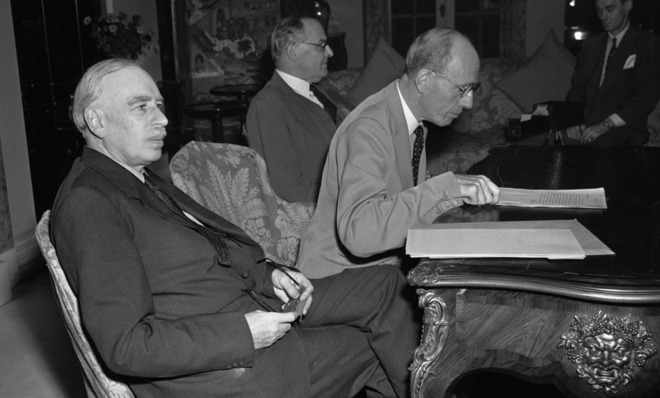Why do Keynesians prefer government spending over private spending?
It’s not because Keynesians are ideologically in favor of big government

A free daily email with the biggest news stories of the day – and the best features from TheWeek.com
You are now subscribed
Your newsletter sign-up was successful
All spending directly lifts GDP by the same amount. So why do Keynesian economists argue that in a recession — when GDP growth remains low for a prolonged period, and when unemployment rises and stays high — that the government should increase spending? Why not instead try to get private individuals and businesses to increase activity to stimulate the economy?
Of course, governments do also attempt the latter. In a garden-variety recession, the central bank drops short-term interest rates in an attempt to encourage private investment (lower rates make it cheaper for businesses to borrow and invest). In the recession that followed the collapse of the financial industry in 2008, the Federal Reserve (with some moderate success) used unconventional monetary policies, such as asset purchases, to stimulate private-sector spending.
But even former Fed Chairman Ben Bernanke has repeatedly indicated that the central bank could use help from the fiscal side in fighting unemployment — and much to his exasperation, Congress never obliged, led by Republicans warning of the evils of runaway spending. Indeed, one theory occasionally postulated by anti-Keynesians is that Keynesianism is a political ploy to increase the number of government programs and jack up government spending.
The Week
Escape your echo chamber. Get the facts behind the news, plus analysis from multiple perspectives.

Sign up for The Week's Free Newsletters
From our morning news briefing to a weekly Good News Newsletter, get the best of The Week delivered directly to your inbox.
From our morning news briefing to a weekly Good News Newsletter, get the best of The Week delivered directly to your inbox.
But Keynes’ theory has nothing whatever to do with the size of the government. It is really about the timing of government spending. Keynes thought that against-the-grain fiscal policy could mitigate the business cycle, which he viewed as a natural outgrowth of the wild animal spirits of the market. When the economy is booming — unemployment low and growth strong — Keynes advised that government should reduce spending and run a surplus, thereby dampening demand and lowering the chance of the economy overheating. And when the economy is in recession, he advised that government should increase spending and run a large deficit, to boost demand and push the economy back toward growth.
Keynes' theory, in other words, is just as compatible with small, lean governments as it is with large, powerful ones. And the real reasons for Keynesian enthusiasm for government spending in a slump are not ideological, but technical.
First, government spending can reduce unemployment by directly creating jobs. In contrast, creating the conditions for greater private spending in no way guarantees more jobs.
Second, government is big and centralized. Instead of subtly nudging millions of individuals and businesses to increase investment, government can turn on a fire hose.
A free daily email with the biggest news stories of the day – and the best features from TheWeek.com
Third, private investment risks a firm or individual’s own supply of money or credit. During a slump, especially one as bad as the last recession, many companies were unwilling to reinvest in the economy for fear of losing money. The animal spirits of the market are powerful, and as the last six years of monetary easing shows, incentives like low rates are often not enough to bring about full recovery. As the controller of the currency, government investment does not carry the same risk, giving government a freer hand to fight unemployment.
So although the multiplier of government spending (the amount of additional activity you get for every dollar spent) in a slump is not necessarily higher than at any other time, it may be the only option available during a severe and deep recession.
It would be wonderful if the magic of the free market rose to the challenge every time the economy took a turn for the worse. But in the real world, investors and markets can stay depressed for months, years, or decades, even if there are massive incentives for private investment. That is why Keynesian economists are willing to accept the costs of a slightly higher government debt load to get unemployment down and boost growth.
John Aziz is the economics and business correspondent at TheWeek.com. He is also an associate editor at Pieria.co.uk. Previously his work has appeared on Business Insider, Zero Hedge, and Noahpinion.
-
 The ‘ravenous’ demand for Cornish minerals
The ‘ravenous’ demand for Cornish mineralsUnder the Radar Growing need for critical minerals to power tech has intensified ‘appetite’ for lithium, which could be a ‘huge boon’ for local economy
-
 Why are election experts taking Trump’s midterm threats seriously?
Why are election experts taking Trump’s midterm threats seriously?IN THE SPOTLIGHT As the president muses about polling place deployments and a centralized electoral system aimed at one-party control, lawmakers are taking this administration at its word
-
 ‘Restaurateurs have become millionaires’
‘Restaurateurs have become millionaires’Instant Opinion Opinion, comment and editorials of the day